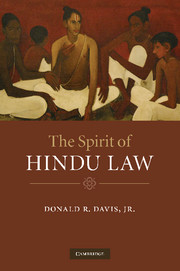Book contents
- Frontmatter
- Contents
- List of tables
- Preface
- Acknowledgments
- List of abbreviations
- Introduction (dharmaśāstra)
- 1 Sources and theologies (pramāṇa)
- 2 Hermeneutics and ethics (mīmāṃsā)
- 3 Debt and meaning (ṛṇa)
- 4 Persons and things (svatva)
- 5 Doubts and disputes (vyavahāra)
- 6 Rectitude and rehabilitation (daṇḍa)
- 7 Law and practice (ācāra)
- Conclusion
- Bibliography
- Index
5 - Doubts and disputes (vyavahāra)
Published online by Cambridge University Press: 26 February 2010
- Frontmatter
- Contents
- List of tables
- Preface
- Acknowledgments
- List of abbreviations
- Introduction (dharmaśāstra)
- 1 Sources and theologies (pramāṇa)
- 2 Hermeneutics and ethics (mīmāṃsā)
- 3 Debt and meaning (ṛṇa)
- 4 Persons and things (svatva)
- 5 Doubts and disputes (vyavahāra)
- 6 Rectitude and rehabilitation (daṇḍa)
- 7 Law and practice (ācāra)
- Conclusion
- Bibliography
- Index
Summary
An essential element beyond how one knows dharma and what constitutes dharma substantively is the question of how to remove doubts about it and resolve disputes that may arise over it. Doubts and disputes fall under the category of vyavahāra. There are two basic meanings of vyavahāra. The first is a general sense of practice, business, or everyday transactions. The other, specific sense is legal procedure, the processes of litigation including a trial. The two senses productively interplay in that legal procedure must take account of legal precedents both about what people have generally done in ordinary life and about what judges have specifically done in court. Day-to-day practice, likewise, is judged to be good or bad in relation to the decisions emerging from legal procedures.
In this chapter, legal procedure is described on the basis of the many definitions offered within Hindu legal texts, but is also set in the context of larger discussions of dharma. The larger issue raised, however, draws inspiration from a new wave in legal anthropology. In recent studies on such diverse places and times as contemporary Africa, nineteenth-century Corsica, and classical Athens, several authors have rethought the once axiomatic truth of legal anthropology that social harmony was at the root of all dispute settlement, i.e., the restoration of social peace through negotiation, giving each party a little of what they claim, etc. In the new wave, by contrast, conflict is seen not only as normal but as essential to the delivery of justice.
- Type
- Chapter
- Information
- The Spirit of Hindu Law , pp. 108 - 127Publisher: Cambridge University PressPrint publication year: 2010



